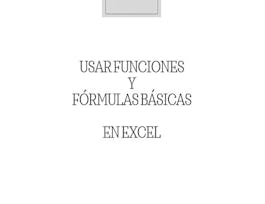The simple spreadsheet is one of the most powerful data analysis tools that exists, and it’s available to almost anyone. Major corporations and small businesses alike use spreadsheet models to determine where key measures of their success are now, and where they are likely to be in the future. But in order to get the most out of a spreadsheet, you have the know-how to use it. This course is designed to give you an introduction to basic spreadsheet tools and formulas so that you can begin harness the power of spreadsheets to map the data you have now and to predict the data you may have in the future. Through short, easy-to-follow demonstrations, you’ll learn how to use Excel or Sheets so that you can begin to build models and decision trees in future courses in this Specialization.



Introduction to Spreadsheets and Models
This course is part of multiple programs.

Instructor: Don Huesman
Sponsored by InternMart, Inc
121,319 already enrolled
(3,821 reviews)
Skills you'll gain
Details to know

Add to your LinkedIn profile
4 assignments
See how employees at top companies are mastering in-demand skills

Build your subject-matter expertise
- Learn new concepts from industry experts
- Gain a foundational understanding of a subject or tool
- Develop job-relevant skills with hands-on projects
- Earn a shareable career certificate


Earn a career certificate
Add this credential to your LinkedIn profile, resume, or CV
Share it on social media and in your performance review

There are 4 modules in this course
This module was designed to introduce you to the history of spreadsheets, their basic capabilities, and how they can be used to create models. You'll learn the different types of data used in spreadsheets, spreadsheet notations for mathematical operations, common built-in formulas and functions, conditional expressions, relative and absolute references, and how to identify and correct circular references. By the end of this module, you'll understand the context of spreadsheets, be able to navigate a spreadsheet, use built-in formulas and functions in spreadsheets, create your own simple formulas, and identify and correct common errors so you can put spreadsheets to work for you.
What's included
6 videos2 readings1 assignment
In this module, you'll move from spreadsheet to model, so you can begin to create your own models that reflect real-world events. You'll learn how to organize and lay out model elements, as well as the types of objective functions and their use. You'll also learn what-if analysis and scenarios, sensitivity analysis, and other classic models. By the end of this module, you'll be able to design a spreadsheet reflecting assumptions, decision variables, and outcomes, create a basic cashflow model, evaluate a small business opportunity, conduct what-if analysis, identify key variables using sensitivity analysis, and linear programming models and deterministic models.
What's included
6 videos2 readings1 assignment
This module was designed to introduce you to how you can use spreadsheets to address uncertainty and probability. You'll learn about random variables, probability distributions, power, exponential, and log functions in model formulas, models for calculating probability trees and decision trees, how to use regression tools to make predictions, as well as multiple regression. By the end of this module, you'll be able to measure correlations between variables using spreadsheet statistical functions, understand the results of functions that calculate correlations, use regression tools to make predictions, and improve forecasts with multiple regression.
What's included
6 videos3 readings1 assignment
In this module, you'll learn to use spreadsheets to implement Monte Carlo simulations as well as linear programs for optimization. You'll examine the purpose of Monte Carlo simulations, how to implement Monte Carlo simulations in spreadsheets, the types of problems you can address with linear programs and how to implement those linear programs in spreadsheets. By the end of this module, you'll be able to model uncertainty and risk in spreadsheets, and use Excel's solver to optimize resources to reach a desired outcome. You'll also be able to identify the similarities and differences between Excel and Sheets, and be prepared for the next course in the Business and Financial Modeling Specialization.
What's included
4 videos3 readings1 assignment
Instructor

Offered by
Why people choose Coursera for their career




Learner reviews
3,821 reviews
- 5 stars
50.51%
- 4 stars
26.81%
- 3 stars
13.70%
- 2 stars
5.51%
- 1 star
3.45%
Showing 3 of 3821
Reviewed on Jun 21, 2017
This course has made me understand cost accounting, has provided a fresh perspective on how to solve some of the challenges i had with management accounting and as a bonus, made me love maths again :)
Reviewed on May 21, 2016
Would give this course 5 stars to be honest. It's just that the lecture slides are not informative enough (only course outlines are there) & look like they weren't made seriously.
Reviewed on Jul 29, 2021
This course is a must for all the learners who want to go ahead and achieve big because this course not just teaches you about financial scenarios etc. but the knowledge can be used in real life
Recommended if you're interested in Business

Corporate Finance Institute

Coursera Project Network

Coursera Project Network

Coursera Instructor Network

Open new doors with Coursera Plus
Unlimited access to 10,000+ world-class courses, hands-on projects, and job-ready certificate programs - all included in your subscription
Advance your career with an online degree
Earn a degree from world-class universities - 100% online
Join over 3,400 global companies that choose Coursera for Business
Upskill your employees to excel in the digital economy


